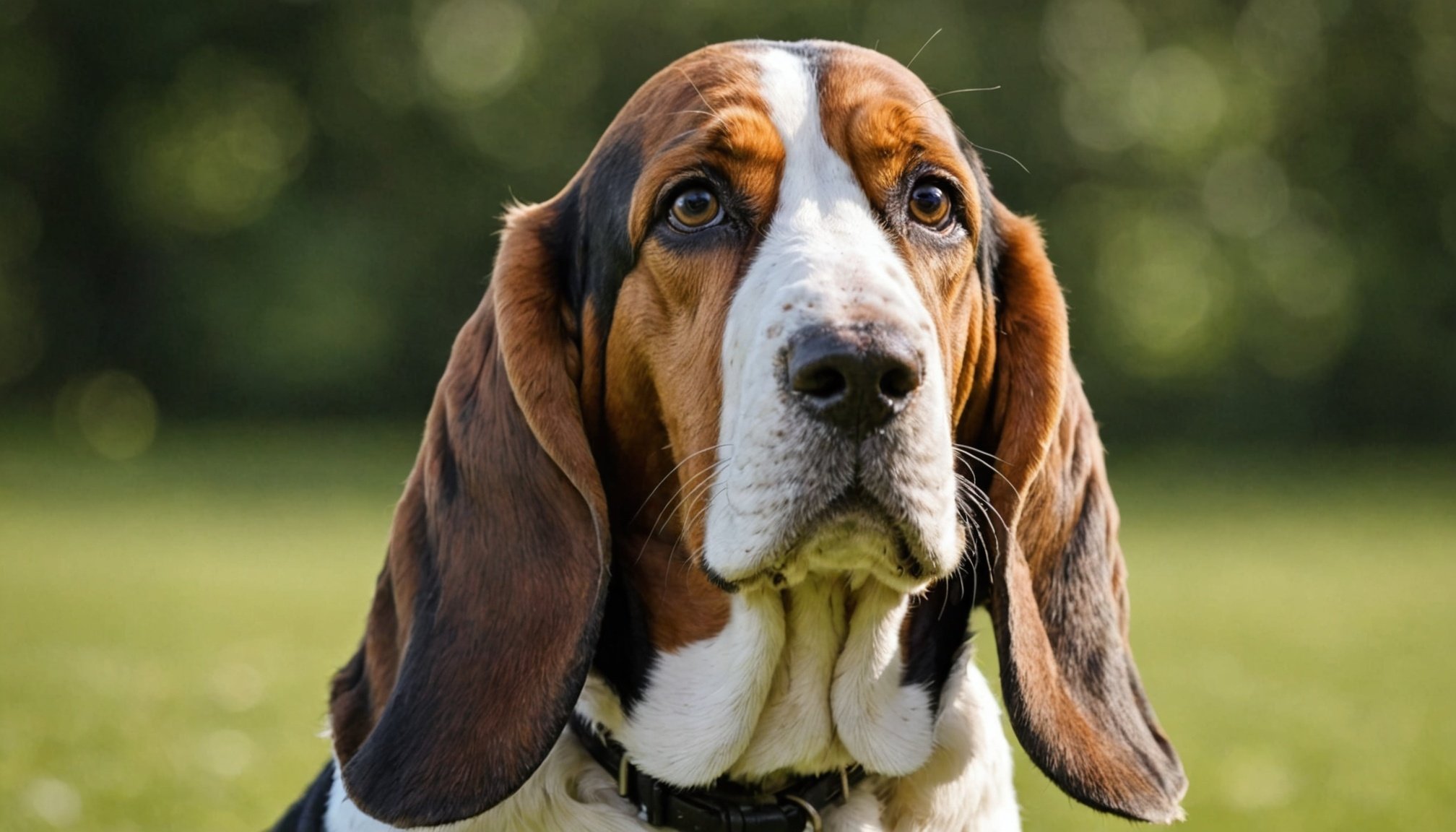Ultimate Guide to Maintaining Spotless and Infection-Free Ears for Your Beloved Basset Hound
Why Ear Care is Crucial for Basset Hounds
When it comes to your Basset Hound, their ears are one of the most critical areas to focus on for their overall health and comfort. Basset Hounds, with their long, floppy ears, are particularly prone to ear infections due to the moist, warm environment their ears create. This makes regular ear care not just a routine task, but a necessity to prevent painful and potentially serious health issues.
“As Basset Hounds have long, droopy ears, they are the ‘poster dog’ of breeds that suffer with frequent ear infections. This is because their ears stay covered most of the time, creating an ideal breeding ground for bacteria – dark, warm, and moist,” explains a veterinarian from Hudson Animal Hospital[5].
Have you seen this : What are the differences in dog breeds, and which breed might be the best fit for my lifestyle?
Understanding the Anatomy and Common Issues
Basset Hounds have a unique anatomy that makes them more susceptible to ear problems. Here are some key points to understand:
Skin and Ear Problems
Basset Hounds often have primary allergies to food proteins, dust mites, mold, or pollen, which can trigger skin and ear inflammation. Their droopy ears and heavy skin folds on the face and body hold debris and moisture, creating an environment conducive to yeast and bacterial growth. This can lead to skin rashes and ear infections, including a common skin yeast called Malassezia[1].
In parallel : What are some fun and engaging games I can play with my dog to bond and exercise together?
Types of Ear Infections
There are three main types of ear infections your Basset Hound could face:
- Otitis Externa (Outer Ear Infection): The most common type, often caused by bacteria, yeast, or parasites thriving in the ear canal. Moisture, allergies, or trauma can trigger this infection[2].
- Otitis Media (Middle Ear Infection): This occurs when an untreated outer ear infection spreads deeper or due to foreign objects or polyps. It can be more serious as the infection moves further into the ear[2].
- Otitis Interna (Inner Ear Infection): A progression from otitis media affecting the inner ear structures responsible for hearing and balance. This serious condition needs prompt veterinary attention[2].
Early Warning Signs of Ear Infections
Identifying the signs of an ear infection early is crucial for effective treatment and preventing further complications. Here are some key symptoms to watch out for:
- Excessive Scratching or Pawing at the Ears: If your Basset Hound is constantly scratching or pawing at their ears, it could be a sign of discomfort or infection.
- Redness Inside the Ear: Redness or inflammation inside the ear canal is a clear indicator of an infection.
- Unpleasant Odor: A strong, unpleasant smell from the ears can signify an infection.
- Frequent Head Shaking: Head shaking or tilting often indicates something is wrong with the ears.
- Discharge from the Ear: Any discharge, whether it’s yellow, green, or bloody, is a sign of an infection[3].
Step-by-Step Guide to Cleaning Your Basset Hound’s Ears
Cleaning your Basset Hound’s ears regularly is essential to prevent infections. Here’s a step-by-step guide on how to do it effectively:
Materials Needed
- Vet-approved ear cleaner
- Cotton balls or gauze
- Treats or toys for reward
Step-by-Step Instructions
- Lift the Ear Flap: Gently lift the ear flap and fill the ear canal with a vet-approved cleaner.
- Massage the Base: Gently massage the base of the ear to loosen debris.
- Allow Head Shaking: Allow your dog to shake their head, dislodging dirt and excess cleaner.
- Wipe Away Debris: Use a cotton ball or gauze to wipe away the remaining debris. Avoid using cotton swabs as they can push debris deeper into the ear canal[2][4].
Practical Tips for Preventive Care
Preventing ear infections involves more than just regular cleaning. Here are some practical tips to help keep your Basset Hound’s ears healthy:
Manage Allergies
- Ensure your Basset Hound is on a balanced diet that helps manage allergies. Omega-6 and omega-3 fatty acids can be particularly beneficial in reducing skin and ear inflammation[1].
Dry Ears Thoroughly
- After swimming or bathing, dry your dog’s ears thoroughly to prevent moisture buildup. A hairdryer on a low, cool setting can be helpful, especially for dogs with longer hair[3].
Trim Ear Hair
- Keep the hair around your dog’s ears neatly trimmed to reduce the chances of moisture getting trapped inside the ear canal. It’s best to have a professional groomer handle the trimming[3].
Regular Veterinary Checkups
- Regular vet checkups are crucial for catching health issues early. Take your Basset Hound to the vet at least once a year for a check-up. Older dogs may need more frequent visits[4].
Common Factors Contributing to Ear Infections
Understanding the common factors that contribute to ear infections can help you take preventive measures:
| Factor | Description |
|---|---|
| Moisture | Trapped water from swimming or bathing creates a warm, moist environment ideal for bacterial and yeast overgrowth[2]. |
| Allergies | Food or environmental allergens can cause inflammation, leading to excess wax production and a favorable environment for yeast and bacteria[2]. |
| Ear Mites | Microscopic parasites that feed on wax and oils, causing intense itching and potential secondary infections from scratching[2]. |
| Foreign Objects | Grass, dirt, or other debris can get lodged in the ear canal, causing irritation and enabling infection[2]. |
| Hormonal Imbalances | Conditions like hypothyroidism or Cushing’s Disease affect skin health and immune defenses, making the ears more vulnerable to infection[2]. |
| Underlying Health Conditions | A weakened immune system or conditions like diabetes can reduce the body’s ability to fight off infections[2]. |
Nutritional Tips for Healthy Ears
The food your Basset Hound eats can significantly impact their ear health. Here are some nutritional tips:
High-Quality Dog Food
- Feed your Basset Hound high-quality dog food that is tailored to their needs. This ensures they receive the necessary nutrients to maintain a healthy weight and support joint health[4].
Joint Supplements
- Basset Hounds are prone to joint problems due to their short, twisty legs. A high-quality joint supplement containing glucosamine and chondroitin can help keep your dog comfortable and mobile longer[1].
Omega Fatty Acids
- Omega-6 and omega-3 fatty acids can help manage and prevent skin and ear inflammation. Fish oil is a good option, but ensure it is balanced and recommended by your veterinarian[1].
Additional Health Tips for Basset Hounds
While ear care is crucial, it’s also important to focus on other aspects of your Basset Hound’s health to ensure they live a long and comfortable life.
Daily Exercise Routine
- Basset Hounds need regular exercise to stay healthy and happy. Aim for about 30 minutes of activity each day, which can be split into two 15-minute sessions if needed. Walking, playing in the yard, and swimming are great options[4].
Mental Stimulation
- Basset Hounds need mental stimulation to stay happy and healthy. Interactive toys like puzzle toys, rubber chew toys, and scent work can help keep their minds active and prevent boredom[4].
Brushing Teeth
- Regular teeth brushing is key for your dog’s health. Start this habit early, using dog-friendly toothpaste and a soft brush made for pets[4].
Monitoring Weight
- Obesity is a major concern for Basset Hounds as it can worsen joint problems and affect overall health. Maintain a healthy diet and exercise routine, and feed smaller meals throughout the day to prevent conditions like gastric dilatation-volvulus (bloat)[4].: Consistent Care for Long-Term Ear Health
Maintaining spotless and infection-free ears for your Basset Hound requires consistent care and attention. By following a regular cleaning schedule, using recommended products, and seeking vet guidance when needed, you can help prevent infections and keep your dog’s ears healthy.
“By paying close attention to ear care, you can help your dog avoid discomfort, infections, and long-term health issues. Regular ear cleaning—especially for dogs prone to infections—is essential,” advises a guide on preventing dog ear infections[2].
Remember, your Basset Hound’s health is in your hands, and with the right care and attention, you can ensure they live a happy, healthy life filled with joy and companionship.















